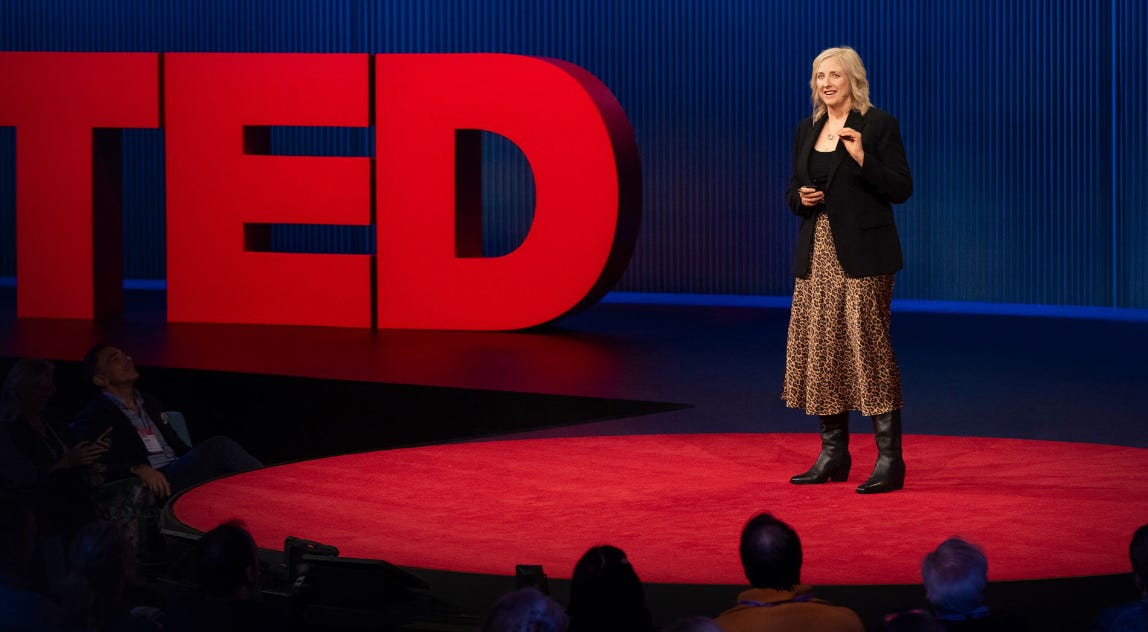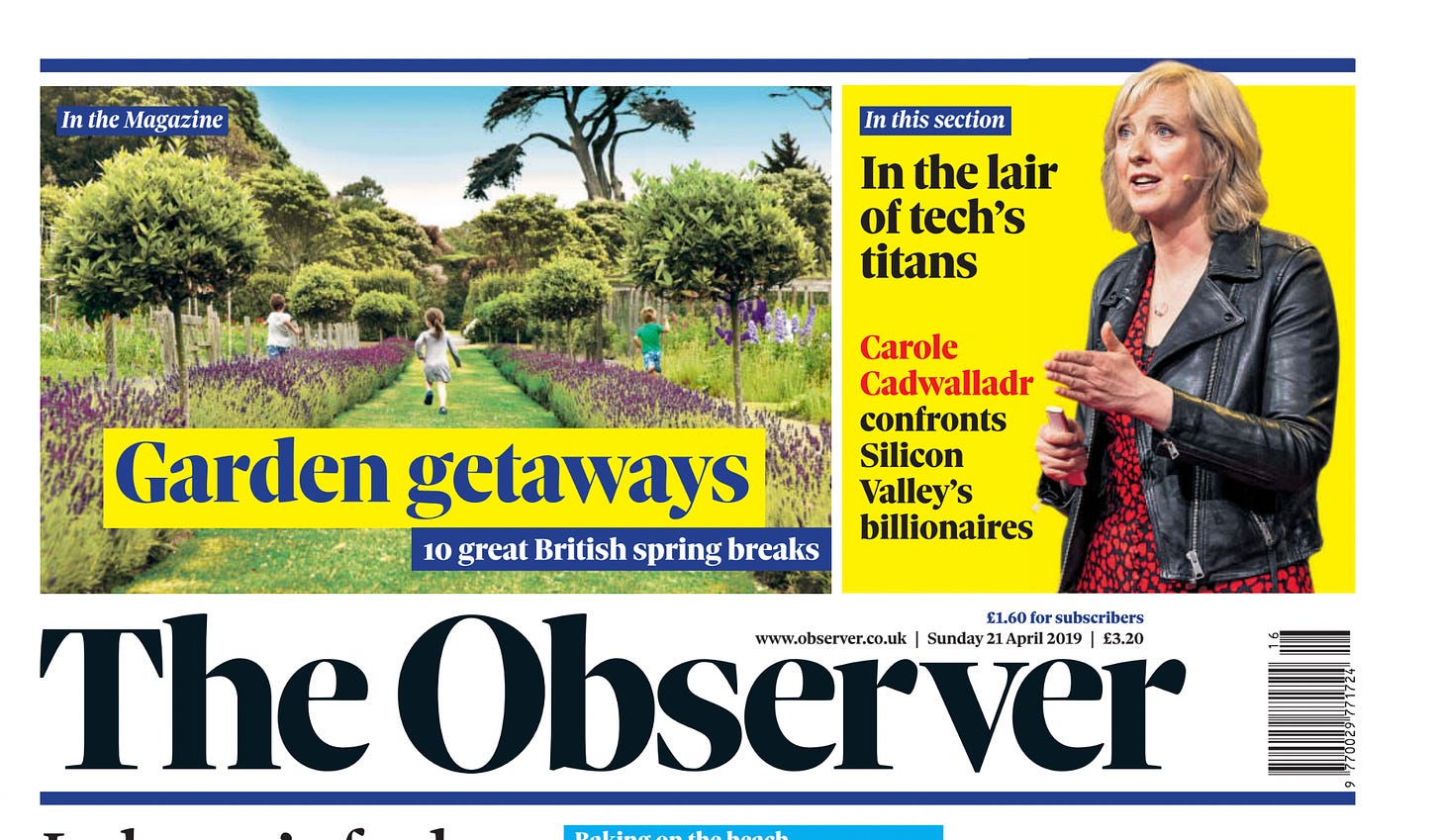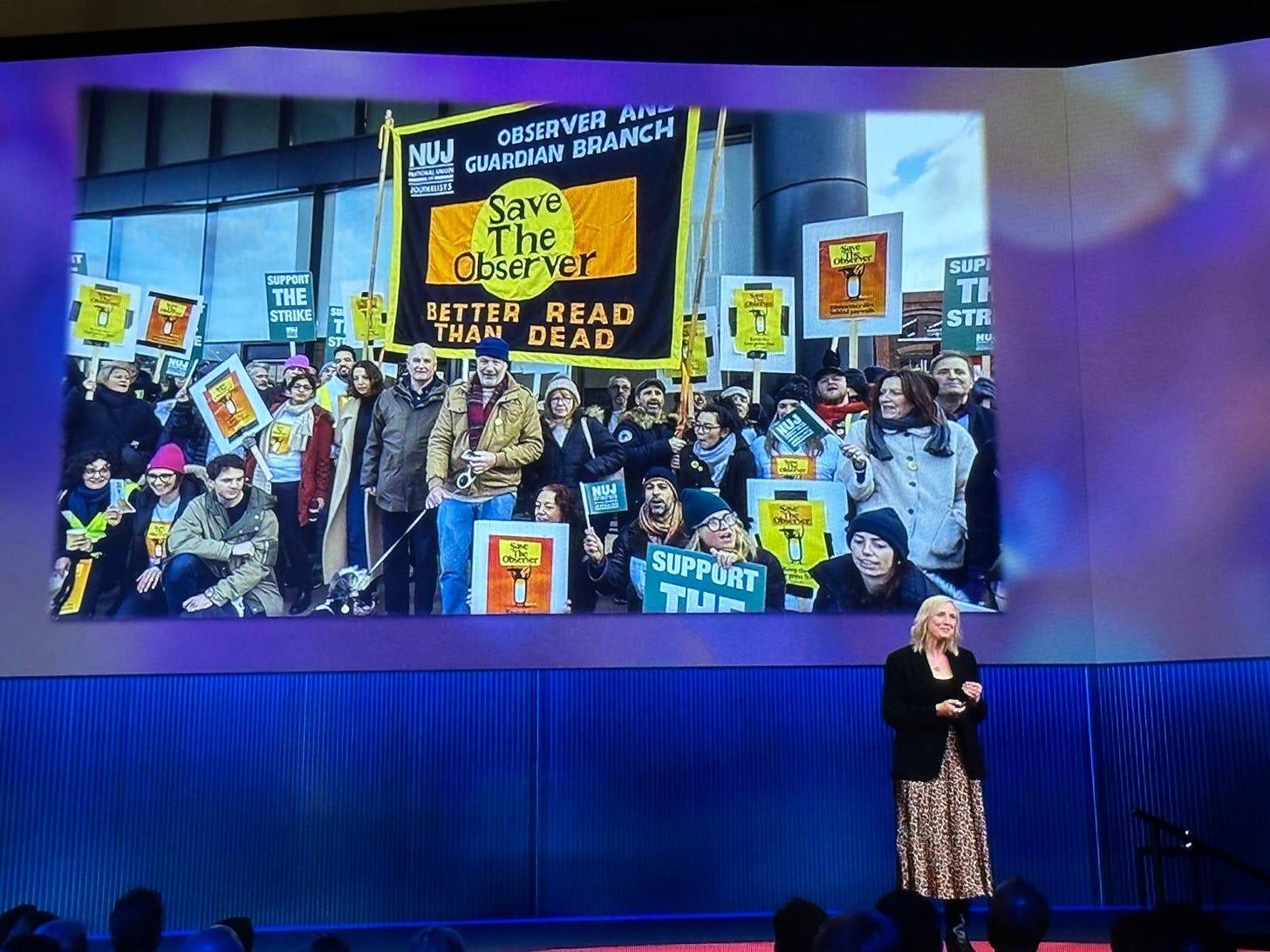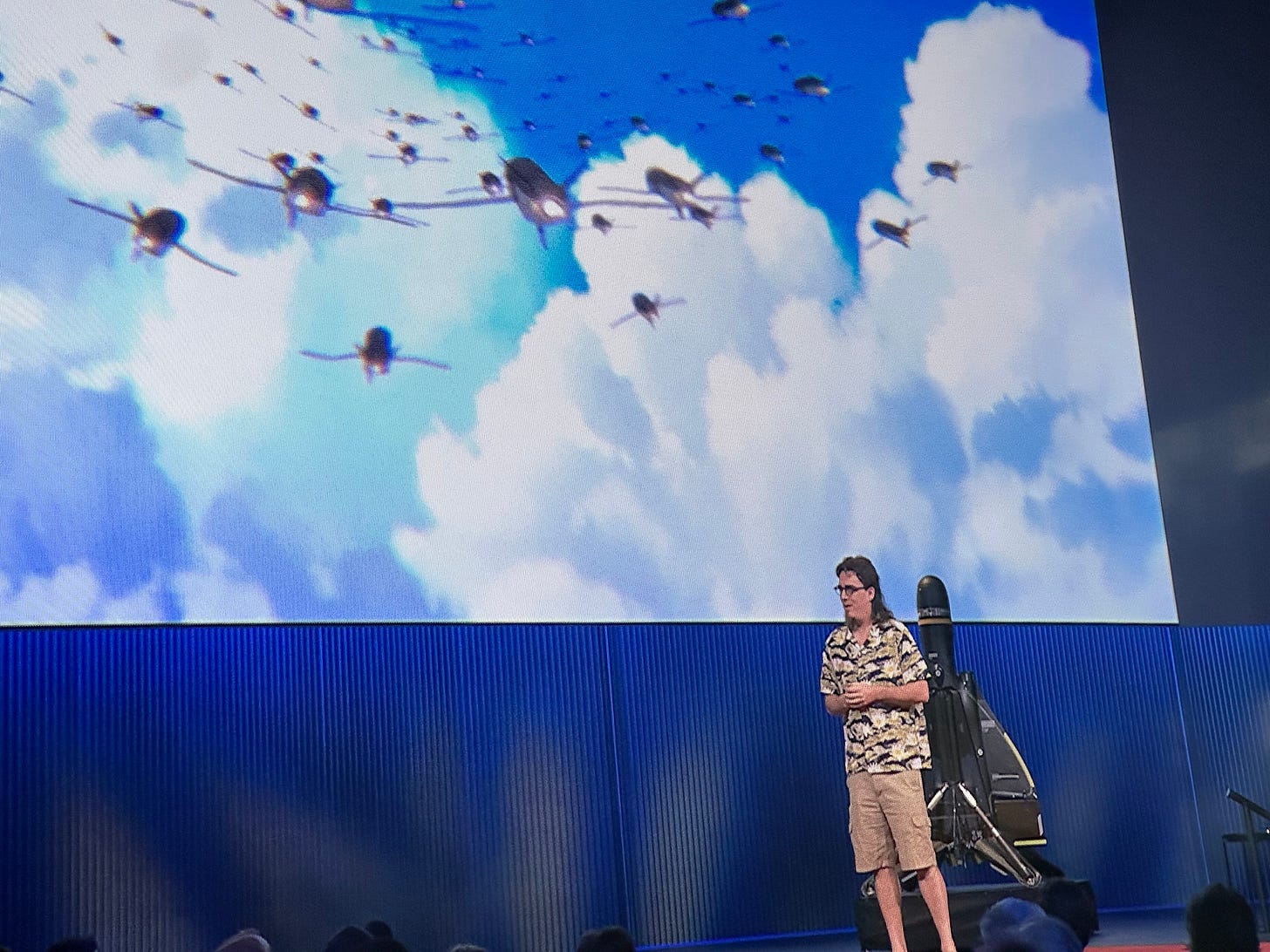In 2019, I gave a talk at TED that created waves: first at the conference, then on the internet and then, convulsively, in my own life. TED is Silicon Valley’s sacred ground. It’s the most consequential tech conference in the world and, in 2019, my talk entitled “Facebook’s role in Brexit – and the threat to democracy” was a break with normal service. It was the first time, a speaker had implicated Silicon Valley directly in the political tumult of 2016. It ricocheted out of the conference and across the internet where it’s now been seen five million times. And, most cataclysmically of all, it precipitated a lawsuit that devoured my time, energy and health.
This week I returned.
It was a big deal on any number of levels. For me, personally, for TED, and, I believe, or at least, hope, for Silicon Valley. I got to send a message to the leaders of these companies from a platform that is inside the temple. I’ve lost my voice and I feel like I’ve lived through a tornado….but with the knowledge that it’s one I’ve chosen to unleash.
TED has just released it as the first talk from the conference. I got to name what is happening for what it is: a coup. I call the Silicon Valley companies who attend this conference and even sponsor it, collaborators who are complicit in a regime of fear and cruelty. And I accuse Sam Altman, the CEO of OpenAI, who is talking here on Friday not just of data theft but data rape.
There’s so much to say and I will write more soon but for now I’d be so grateful if you watch it and share it with your families and friends. In spite of everything, I’m grateful to have been given this platform and to be able to communicate what I believe are vital truths but I have paid a price for doing this work and the last week has been a rollercoaster of emotions: doubt, self-questioning, denial, overwhelm, fear.
And in the middle of it, the night before I flew to TED, I went to the Observer’s farewell party. This Sunday marks the end of the newspaper as we know it. Six years ago, I got to write about the experience of giving my TED talk in the Guardian/Observer. Paul Webster, the editor, put it on the front page.
This time around, that’s not possible. TED gave me editorial freedom to say what I wanted. The Guardian/Observer won’t even allow me to write about it, in any form.I pitched a piece for this Sunday about the experience. It would be my last article for the paper, it transfers to Tortoise next week who have declined to renew my contract; an epitaph to my 20-year career there and an an end point to an investigation that brought the Guardian and Observer extraordinary kudos and the most money it has ever raised from any story. It was turned down. That is an extraordinary indictment.
Here, instead, is a still from the talk. I believe that existing movements – the labour movement, the civil rights movement – are fundamental to asserting our rights against Silicon Valley, to rebuilding the internet from the ground up to rejecting the autocratic takeover not just the US but our reality: we all live on these platforms.
I’m six years older than when I gave that first talk though I feel 106 years older. Part of my reason for going through with it – and it was touch and go whether I would – was because, as I say at the end, I’m reclaiming my story. I’ve been trapped in someone else’s narrative. And I also really want to use it as a personal moment of change. In 2016, I threw myself over what felt like an about-to-explode bomb. I ended up absorbing the shock blast from something that was much bigger than me: the waves of destruction that the technological and political changes of 2016 sent through the system. I need to mark this chapter as now over and put back together some of the bits that shattered through this process.
But mostly, the talk is a huge thank you to the people who supported me through my legal trials. The 30,000+ people who contributed to my crowdfunder and held me up. You are the model for what is needed in the next days and years.
This is what we’re up against. This was Palmer Luckey, on stage the day after me. That’s an autonomous missile next to him. He’s a US defence contractor, Trump cheerleader. He got a standing ovation.
In my talk, I could feel waves of hostility coming from some people in the room. TED is ground zero of the AI gold rush. But there was also cheerleading and l’ve been overwhelmed by huge love and support from others who see exactly what is happening. It’s the weirdest time to be here. And it was the weirdest energy from an audience of any talk I’ve ever given. But then, it was intended to make them uncomfortable. Politics is technology now. Silicon Valley is desperate to deny that, but it can’t and nor can we.
Transcript: This is what a digital coup looks like
00:04
I’ve been feeling a lot of panic and fear about this talk.
And not just for the normal reasons of public speaking,
although that’s there, too.
But it’s also because I want to say something meaningful,
and I’ve been overwhelmed by the enormity
of what is happening right now.
And there’s a particular set of circumstances
which have also been feeding into my confusion and denial.
00:36
And that is because the last time that I stood on this stage,
it led to a three-year legal battle,
culminated in London’s High Court,
in which it felt like I was on trial for my life,
because I was.
My career, my reputation, my finances,
even my home was on the line.
All because I came here
to warn you
that I didn’t think democracy was going to survive the technology
that you’re building,
however incredible it is.
01:13
In fact, I was the person who almost didn’t survive,
and pretty much everything I was warning about is now coming true.
I can’t sugarcoat it.
It’s a bit of a headfuck.
01:27
(Laughter)
01:30
I have a lot of emotions about coming here.
And TED, also, I suspect, is feeling them too.
But what actually I finally realized yesterday
is that the denial and the confusion that I’ve been feeling
is maybe what you’re feeling, too.
01:48
I felt powerless for a really long time.
So if that’s what you’re feeling, I get it.
But we have to act now.
My alarm system is ringing again.
There are things that we can do.
In my case, I survived.
And you will too.
But it’s by learning how to fight back.
02:16
This is my guide,
and it has to start with naming it.
It’s a coup.
02:26
I know you probably don’t want to hear that, and especially here,
but we can’t fight it if we can’t see it.
And we can’t see it if we don’t name it.
02:34
(Applause)
02:41
The Russian and American presidents are now speaking the same words.
They are telling the same lies.
We are watching the collapse of the international order in real time.
And this is just the start.
02:58
Coups are like concrete.
When they stop moving, they set.
It is already later than we think.
03:07
This image, some of you in this room might know these people.
I call it tech bros in hostage situations.
It’s a message to you.
This is Putin’s playbook.
He allows a business elite to make untold riches
in exchange for absolute loyalty.
03:26
Some people are calling this oligarchy,
but it’s actually bigger than that.
These are global platforms.
It’s broligarchy.
[Tech bros + oligarchy = broligarchy]
03:40
(Laughter and murmuring)
03:42
(Applause)
03:48
There is an alignment of interests
that runs through Silicon Valley
to what is now a coming autocracy.
It’s a type of power that the world has never seen before.
04:07
[Follow the data]
04:09
It’s always the data.
It’s the crack cocaine of Silicon Valley.
You know, the first thing that Elon Musk did
was to send his cyber troops into the US Treasury
to get access to the data.
That is not a coincidence.
It’s a hack.
That data is now feeding AIs that are choosing who to sack
and who to replace —
Sorry — eliminate fraud and waste.
04:34
(Laughter)
04:36
When we broke the Cambridge Analytica story
about the harvesting [of] 87 million people’s Facebook data,
people freaked out, rightly.
[That] is chicken feed compared to [this].
But it is the blueprint.
It’s always the data.
Which is why it’s so important
that you start thinking about your private life.
The broligarchy doesn’t want you to have one.
This is the old headquarters of the East German secret police.
They kept detailed files on almost one in three of their citizens.
That is nothing compared to what Google has
on every single one of us,
and hundreds of other companies.
The entire business model of Silicon Valley is surveillance.
It harvests our data in order to sell us stuff.
We are already living inside the architecture of totalitarianism.
05:40
(Cheers)
05:42
(Applause)
05:44
It may not have been deliberate,
but we now have to start acting as if we live in East Germany,
and Instagram is the Stasi.
05:58
Politics is downstream from culture.
So I actually learned this from somebody
who I think of as one of the great philosophers of our age,
Steve Bannon.
06:10
(Laughter)
06:11
He actually stole it from somebody else.
But it’s not politicians who have the power.
He knows that.
It’s why he’s a podcast bro, these days.
But culture now is just what’s next on your phone.
And that’s AI.
Culture is AI now.
And forget the killer robots.
If you want to know what the first great AI apocalypse is,
we’re already living it.
It’s total information collapse.
And if you take one thing only away from this talk,
it’s politics is technology now.
And that’s why everybody in this room, you can’t look away.
It’s why your CEOs have been taken captive
and are paraded on TV like hostages.
But you, you have a choice.
07:13
So Trump, he calls the press the enemies of the people.
And he probably doesn’t even know that he’s quoting Stalin.
So what happened to me is a playbook,
and it’s now coming for all sorts of other people.
It was actually a friend of this guy who came after me.
This is Nigel Farage.
He’s a Brexit funder.
I’m not going to go super into the details.
But 19 press-freedom organizations
called the lawsuit against me a SLAPP.
That means it’s a Strategic Litigation Against Public Participation.
A really long-winded way of saying
it’s using law as a weapon to shut people up.
Not just journalists, but other public people, too.
And it works.
08:06
I just wanted to tell you about one aspect of the litigation,
which I found terrifying.
And that was the data harvesting.
There’s this quote you may know, it’s Cardinal Richelieu,
“If you give me six lines
written by the hand of the most honest of men,
I will find something in them which will hang him.”
In my case,
the first forensic searches of my phone and laptop
yielded 40,000 pieces of data.
It was my messages, my emails,
my voice memos, my personal life.
And the whole thing about this,
the attack which came for me, was really personal.
Because the thing about this litigation is only one part of the playbook.
It was also this sort of massive online campaign of abuse,
which is just day after day,
after day, after day.
Because my most unforgivable crime was reporting while female.
It was a digital witch burning.
09:16
And I believe that this man came after me personally,
not at “The Guardian” and not TED,
it was because I looked like the weakest link.
But he was wrong.
09:29
(Cheers and applause)
09:37
30,000 people rose up to support me.
They contributed almost a million pounds to a legal defense fund.
Because they saw a bully trying to crush me,
and they would not let it stand.
And it always makes me emotional when I think about that.
I just heard somebody was saying, the camera person,
I don’t know where they are, contributed.
This whole talk is actually my gratitude towards everybody who did that.
But it’s also why I know about what we have to do next.
You know, Trump is suing news organizations,
and every day they’re settling.
These are big corporates with corporate interests.
Not everybody can stand up to power,
but there are people who are doing it, and we can support them.
We have to have each other’s backs right now.
Because we are the cavalry now.
10:35
You know, this is really important to me,
but I spoke to a UK libel lawyer before this talk.
I want to say that there is an awful lot of facts set down
in a High Court judgment,
and we’re actually taking the case now to the European Court of Human Rights.
We’re testing the UK on its laws around freedom of expression.
So look after facts.
You’ll miss them when they’ve gone.
This is Wayback Machine.
Give them money,
they’re trying to preserve the internet as it’s being deleted day by day.
11:08
(Applause)
11:12
History is our best chance of getting out of this.
11:16
You know, you probably know this phrase,
“Do not obey in advance.”
That’s Tim Snyder, who’s a historian of authoritarianism.
We now are in techno-authoritarianism.
We have to learn how to digitally disobey.
That can be as simple as the dropdown box.
Don’t accept the cookies,
don’t give your real name,
download Signal, the encrypted messaging app.
Don’t bomb Yemen,
don’t add the editor of “The Atlantic” to your group chats.
11:44
(Laughter)
11:49
Don’t experiment on children.
You know, social mores change.
We don’t send children down coal mines anymore.
And in years to come,
allowing your child to be data-harvested from birth
will be considered child abuse.
You didn’t know, but now you do.
12:09
Privacy is power.
And we have more of it than we think.
12:17
I had this little epiphany yesterday in which I realized, actually,
the moments when I felt most powerless
were the moments that I felt I was actually most powerful.
It was because my journalism had impact.
They want us to feel powerless.
That’s the plan.
There is so much, though,
that we can learn from people who’ve been through this before.
12:39
Alexei Navalny,
the leader of the Russian opposition,
he always talked about a beautiful Russia of the future.
He painted a vision.
There is a beautiful internet of the future,
free from corporate capture and data tracking.
We can build it.
It is going to take a movement.
But we can learn from movements that there have been before us.
This is my colleagues and I on strike in December
because my news organization, “The Guardian,”
decided to sell our corner of it, “The Observer,” the Sunday title.
And it was a battle we really didn’t need at this time,
and we didn’t actually win,
but you know, you can’t win every battle.
But you definitely won’t win if you don’t fight.
13:33
(Applause)
13:38
So I want to leave you with this.
This is ChatGPT
writing a TED Talk in the style of Carole Cadwalladr.
And it is creepily plausible.
But what it doesn’t know,
because AI is actually as dumb as a rock,
is that I am going to turn to Sam Altman,
who is coming here, a TED speaker,
and say that this does not belong to you.
ChatGPT has been trained on my IP,
my labor, my personal data.
14:18
(Applause and cheers)
14:24
And I did not consent.
14:28
You know, “The Guardian” has effectively got rid
of more than 100 journalists.
We actually leave the building next week.
And shortly afterwards,
it signed a syndication deal with OpenAI.
Or, as I think of it,
it married its rapist.
14:49
But I do not consent.
And while we still have copyright laws in my country,
UK government is trying to tear them up at the moment
in order to suck up to Silicon Valley and Trump.
But while we have them, use them.
Because what is happening to my industry
is happening to yours, too.
And it’s more than theft.
It’s a violation.
Data rights are human rights.
15:18
(Applause)
15:23
In 2019,
I came here, and I called out the gods of Silicon Valley.
I was wrong.
Sam Altman, Mark Zuckerberg, Elon Musk,
you are not gods.
You are men, and you are careless.
15:45
(Applause and cheers)
15:53
You think that by allying yourself with an autocrat
you will be protected.
That’s not how history works.
It’s not even how oligarchy works.
16:04
This is Mikhail Khodorkovsky.
He was an oligarch until he was sent to Siberia,
to prison for 10 years,
after Putin tired of him.
16:15
You are sucking up to a tyrant …
who is trying to destroy the laws
who made your businesses possible.
You are collaborators.
You are complicit in a regime of fear and cruelty.
But the rest of us,
we all here, we have a choice.
16:43
I chose to come back to TED
because I’m reclaiming my story, my words.
16:52
(Cheers and applause)
17:03
We are not powerless.
The 30,000 people who supported me
proved that — we are not powerless.
Because we know who we are, and we know what we stand for.
And my question to Silicon Valley is,
do you?
17:26
This post has been syndicated from How to Survive the Broligarchy, where it was published under this address.




